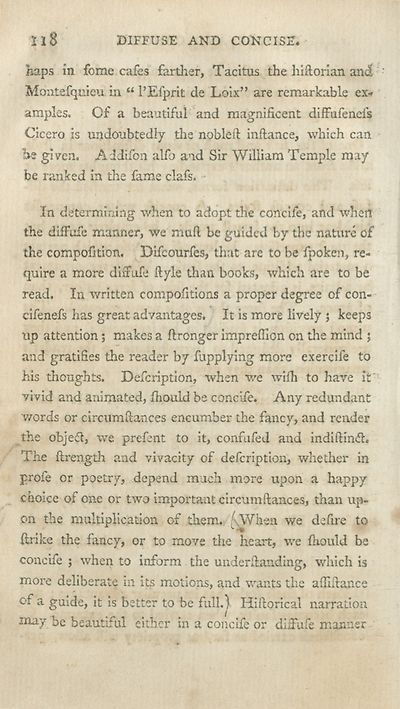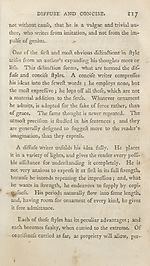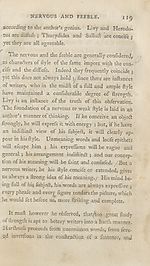Download files
Complete book:
Individual page:
Thumbnail gallery: Grid view | List view

DIFFUSE AND CONCISE.
118
baps in feme cafes farther, Tacitus the hiftorian and
Montefquicu in “ 1’Efprit de Loix” are remarkable ex¬
amples. Of a beautiful and magnificent diffufenefs
Cicero is undoubtedly die noblefl: inftance, which can
be given. Addifon alfo and Sir William Temple may
be ranked in the fame clafs.
In determining when to adopt the concife, and when
the dilFufe manner, we mull be guided by the nature of
the compofition. Difcourfes, that are to be fpoken, re¬
quire a more diffufe llyle than books, which are to be
read. In written compofitions a proper degree of con-
cifenefs has great advantages. It is more lively ; keeps
up attention; makes a ftronger impreffion on the mind ;
and gratifies the reader by fupplying more exercife to
his thoughts. Defcription, when we wilh to have it'
vivid and animated, fiiould be concife. Any redundant
words or circumftances encumber the fancy, and render
the objedt, we prefent to it, confufed and indiftindt.
The ftrength and vivacity of defcription, whether in
profe or poetry, depend much more upon a happy
choice of one or two important circumftances, than up¬
on the multiplication of them. (When we defire to
ftrike the fancy, or to move the heart, we fiiould be
concife 5 when to inform the underftanding, which is
more deliberate in its motions, and wants the afliftance
of a guide, it is better to be full.) Hiftorical narration
may be beautiful either in a concife or diffufe manner
118
baps in feme cafes farther, Tacitus the hiftorian and
Montefquicu in “ 1’Efprit de Loix” are remarkable ex¬
amples. Of a beautiful and magnificent diffufenefs
Cicero is undoubtedly die noblefl: inftance, which can
be given. Addifon alfo and Sir William Temple may
be ranked in the fame clafs.
In determining when to adopt the concife, and when
the dilFufe manner, we mull be guided by the nature of
the compofition. Difcourfes, that are to be fpoken, re¬
quire a more diffufe llyle than books, which are to be
read. In written compofitions a proper degree of con-
cifenefs has great advantages. It is more lively ; keeps
up attention; makes a ftronger impreffion on the mind ;
and gratifies the reader by fupplying more exercife to
his thoughts. Defcription, when we wilh to have it'
vivid and animated, fiiould be concife. Any redundant
words or circumftances encumber the fancy, and render
the objedt, we prefent to it, confufed and indiftindt.
The ftrength and vivacity of defcription, whether in
profe or poetry, depend much more upon a happy
choice of one or two important circumftances, than up¬
on the multiplication of them. (When we defire to
ftrike the fancy, or to move the heart, we fiiould be
concife 5 when to inform the underftanding, which is
more deliberate in its motions, and wants the afliftance
of a guide, it is better to be full.) Hiftorical narration
may be beautiful either in a concife or diffufe manner
Set display mode to:
![]() Universal Viewer |
Universal Viewer | ![]() Mirador |
Large image | Transcription
Mirador |
Large image | Transcription
| Antiquarian books of Scotland > Languages & literature > Abridgement of lectures on rhetoric > (134) |
|---|
| Permanent URL | https://digital.nls.uk/135468062 |
|---|
| Description | Thousands of printed books from the Antiquarian Books of Scotland collection which dates from 1641 to the 1980s. The collection consists of 14,800 books which were published in Scotland or have a Scottish connection, e.g. through the author, printer or owner. Subjects covered include sport, education, diseases, adventure, occupations, Jacobites, politics and religion. Among the 29 languages represented are English, Gaelic, Italian, French, Russian and Swedish. |
|---|

